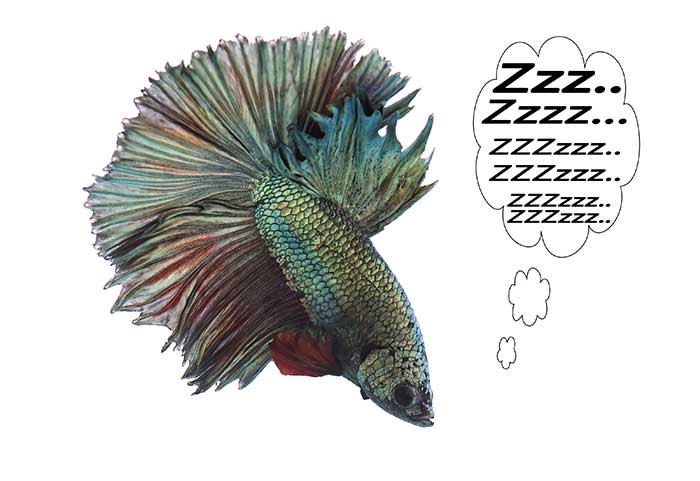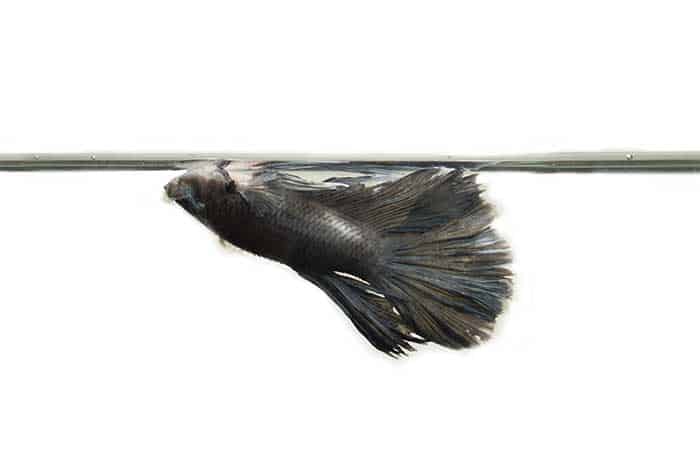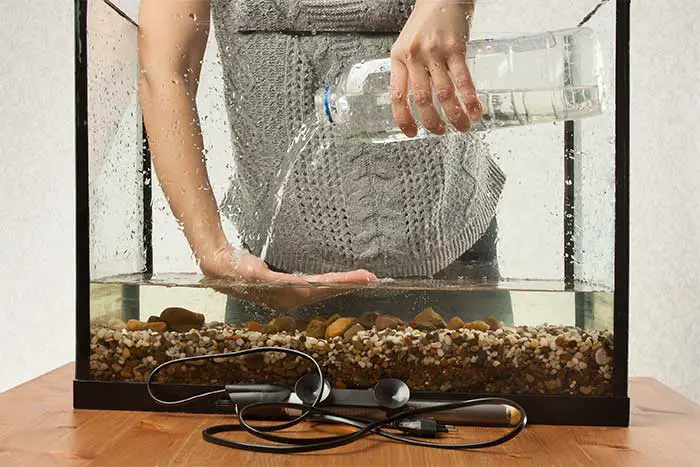Do Betta Fish Sleep (Unusual sleeping habits revealed)
Betta fish seem to be the new craze in the pet world. These little guys are not only beautiful, but they’re pretty interesting to watch. Many new betta owners have questions about their bettas sleeping and resting habits.
Keeping betta fish can be much more rewarding the more you learn, so let’s answer the question, “Do betta fish sleep” and also answer some of the most common questions about betta fish sleep behavior.
If you are a new betta owner, I highly recommend reading my article: Betta Fish Care Guide And Species Overview For Beginners.

Do Betta Fish Sleep?
Betta fish do sleep. In fact, betta fish have some very unusual sleeping habits. You can find them snoozing in some very unusual positions, wedged behind the filter, or playing dead on the substrate. Betta fish are also known to sleep out of the water, often napping for several hours at a time.
Betta fish need sleep for good health as it plays an important role in many biological functions such as metabolism, hormone release, physical health, and mental well-being.
Water temperature can also play a part in how often a betta fish will sleep. If your betta is sleeping too much, their tank water could be too cold, which can make them quite lethargic. Bettas prefer warm water, which will make them more energetic.
You can read my guide: Do Betta Fish Need A Heater (Can they live in cold water), for more information on how water temperature can affect a betta fish.
When Do Betta Fish Sleep?
Betta fish will typically sleep at night much like people, especially as a betta’s night vision isn’t quite as good as some other fishes. When betta fish are asleep, they like to be hidden from potential predators, so sleeping at night will give them the best cover.
During the day, betta fish are usually quite active, and you’ll see them swimming around and exploring their surroundings, but they tend to be calmer at night when they may rest at the bottom of their tank or on a plant.
How Long Do Betta Fish Sleep?
Although you may not notice, betta fish sleep an average of 8-12 hours a day. It seems like a lot of sleep, but bettas don’t take their sleep all in one go.
Betta fish also won’t sleep through the whole night as they do like feeding periods and can navigate in the dark by using pressure sensors located along their lateral line.
A betta’s lateral line runs along the middle of its body, from the tip of the nose to the end of its tail, and can detect minute changes in pressure waves in the surrounding water. These pressure waves can help a betta fish sense objects, prey, and predators, so good night vision is unnecessary.

There isn’t a specific amount of time that a betta fish will sleep, and they can survive on much less sleep than I mentioned above. In fact, it depends on an individual betta fish who will take whatever amount of sleep it needs. If you have a lazy betta, it may sleep as much as 14 hours a day.
Do Betta Fish Sleep During The Day?
Betta fish will usually snooze during the day, taking many short naps, even though this is a time that bettas are much more active.
Bettas are very aware of potential threats from predators and bullying tank mates, making them very light sleepers, so daytime naps may only last for between 5 minutes and sometimes up to 1 hour.
Many animals will have periods of sleep throughout the day and night instead of having all of their sleep in one go, which is also how early humans would behave.
Animals have not evolved in the same way, so fish will sleep for shorter periods and eat whenever they can, often going through periods without food, so it is unlikely that you will see your betta fish putting on its PJs, ready for a good night’s sleep.
How Do Betta Fish Sleep?
Betta fish sleep in all sorts of unusual ways which can often catch out a new betta owner who may think their new betta fish has died suddenly.
Betta fish will sleep on their sides, backs, or bellies, either floating around the tank or lying on the substrate. Bettas love to sleep in tight spaces, such as behind the filter. Betta fish are also one of the only fish that can sleep out of the water and often make their bed on a sturdy leaf.
When betta fish are sleeping, they can often look dead, which is part of their defense mechanism from predators. During sleep, a betta’s color will often fade, and they may sleep upside down, lying perfectly still, or will just float with the current, often putting predators off because dead fish often carry diseases. Color fading is often quite prominent in the more colorful male betta fish.
In general, sleeping fish are much easier to spot as they will nestle into the undergrowth and stay perfectly still, or a sleeping fish will often sit at the bottom or in a quiet corner without displaying many of the sleeping characteristics of a betta.
The swim bladder helps fish to remain buoyant while they sleep, which is why they don’t float to the surface or sink to the bottom.
Do Betta Fish Like Light At Night?
Because bettas don’t have eyelids, keeping your aquarium light on at night will have an impact on the sleeping behavior of your betta fish. Ideally, you should turn off your aquarium light at night to provide the day/night cycle that fish experience in the wild.
How much light a fish tank gets can have an impact on a betta’s sleep cycle and will affect many of the natural processes that happen in an aquarium.
A few other reasons to turn off your aquarium light at night:
- The day/night cycle predominantly affects the circadian rhythm. The circadian rhythm regulates which chemicals and hormones are released into the body depending on the time of day or night and is generally dictated by how light or dark it is.
- Betta fish thrive in environments with live plants. If your aquarium has live plants, they will provide oxygen throughout the daylight hours and carbon dioxide at night. Both chemicals benefit a fish tank, so this is another reason to turn off your fish tank light at nighttime.
- Too much light will encourage algae to grow inside your tank, and algae blooms can lead to a reduction in water quality, leading to health problems and disease. Keeping your tank away from intense light and turning off the light at night will reduce the opportunity for algae to grow.

Can Betta Fish Sleep With Light On?
Although betta fish can sleep with the tank light on, a sleeping betta fish will prefer shady areas to block any intense light. In their natural habitat, betta fish usually live in densely planted areas that provide lots of shade where they can rest.
Aquarium lamps can be pretty strong, so if your tank does not have many areas of shade, try adding a few floating plants to block light from the surface or add some ornaments with caves or tunnels where your betta can take shelter.
For more information on aquarium lighting at nighttime, read the articles below:
Can Betta Fish See in the Dark?
Do Betta Fish Sleep With Their Eyes Open?
Betta fish have to sleep with their eyes open due to a lack of eyelids, often making it difficult to know when they are asleep. Betta fish typically sleep near or under plants that provide cover from predators. Ornaments that give hiding spaces, like caves or tunnels, are a helpful addition.
Because a betta sleeps with its eyes open, this is another good reason to dim the aquarium light at night or you can switch it off altogether.
Do Betta Fish Sleep On The Bottom Of The Tank?
Don’t be surprised if you find your betta fish sleeping on the bottom of the tank. Betta fish will rest just about anywhere in the tank that they can get some peace, so you will often find them lying on the bottom of the tank or making their bed behind the inlet filter to escape the current.
You can often find a sleeping betta on a leaf or ornaments that are protruding from the water. Betta fish can breathe oxygen from the air and from the water as they are one of the few fish with a labyrinth organ that gives them this unusual ability and enables them to survive for a while outside of their tank.
In the video below, you will see several betta fish sleeping during the daytime and outside of the water, resting on some leaves.
Betta hammocks are one of the latest trends. You can find betta hammocks in most pet stores, and they usually come in the shape of a leaf. The betta hammock can be stuck to the tank glass via a sucker and will provide a perfect bed for a sleepy betta fish.
How Do You Know If Your Betta Fish Is Sleeping?
Although it can sometimes be difficult to tell when your betta is sleeping, especially when their eyes remain open, it is usually quite obvious that your betta is taking a nap, as there are a few tell-tale signs.
Some of the easiest ways to tell when your betta is asleep are:
- Your betta will be hiding out of sight for longer periods. – If you can’t see where your betta has gone, it is likely that it will have found a quiet spot under some plants or inside an ornament where it won’t be disturbed.
- Your betta may be lying on the bottom of the tank, sometimes curled up or on its side. – Betta fish will happily lie on the substrate at the base of the tank, provided they don’t feel exposed or threatened. Betta fish may also find a big leaf to perch on, where they can fall asleep out of harm’s way.
- Betta fish can lose some of their colors when sleeping. – Color loss is a form of self-defense as it makes them less noticeable to predators. Color loss also happens when bettas die, which can be worrying to some owners watching their fish sleep. When a betta wakes, the color will return quickly. Old age in betta fish also causes color fading gradually over time that doesn’t return during waking hours.
- Your betta fish may float vertically with its nose pointing toward the ground. – This is a common position for betta fish to sleep, but if your betta is swimming in this position more often, it may be a sign of swim bladder disease.
Each individual betta fish will display their own characteristics, especially with napping habits. Some betta fish will have a particular place to nap, which can sometimes be quite unusual.
It is completely normal if you find your sleeping betta wedged into some tiny places. A sleeping betta can be found wedged between the filter, inside small caves, and in many other tight spots.
Because betta fish are light sleepers, it will be easy to startle them, so unless you are really concerned, it is best to just leave them to sleep.
Is My Betta Fish Dead Or Sleeping?
If you are asking yourself, “is my betta fish dead or just sleeping?” you are in the same position as anyone keeping betta fish. It can be very difficult to tell if you have a sleeping betta fish or whether your fish died suddenly from old age or sickness.
When a betta appears to be asleep, you should still notice them moving water over its gills to breathe. The movement of the fish gill is generally quite prominent. As you get used to your betta’s sleep pattern, it will be easier to judge normal behavior from the more unusual behavior.
I have briefly mentioned that a betta’s color can fade while they are asleep, similar to what you will see in a dead or sick betta. You will not know if the color loss is caused by sleep until your betta wakes up and the color returns.
Final Thoughts
Betta fish do sleep, but it can be difficult to tell when they are sleeping. The best way to check if your betta is asleep or just resting is by observing their behavior and activity levels for a while.
You may often find your betta fish hiding when it wants to sleep, which is a natural instinct, and means you often won’t catch them sleeping. If your betta feels comfortable in its tank, it may just lie on the substrate for a snooze.
In general, healthy betta fish do sleep for short periods of time during the day and for longer periods at night.
Many new betta owners will be concerned when seeing their betta sleeping as they can look like they may be dying. If this is your first betta, it will take a while to understand its sleep behaviors.
If you have any concerns that your fish may be unwell, contact a veterinarian who specializes in fish health or speak to your local pet store for some advice. Thanks for reading!








